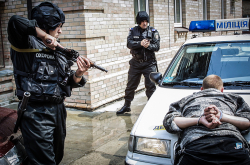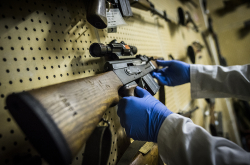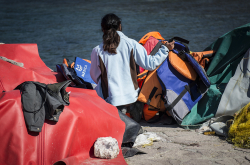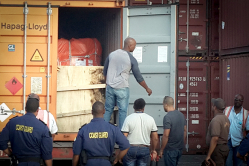LYON: Tackling illegal immigration and the trafficking of firearms and drugs was the focus of an operation supported by INTERPOL and Europol to combat organized and serious international crime originating from Southeast Europe.
The four-day operation (24 – 27 September), coordinated by the European multidisciplinary platform against criminal threats (EMPACT) and led by the Spanish Guardia Civil, saw 33 countries team up during joint action days (JADs).
Nearly 9,000 law enforcement officers were involved in the operation and included police officers, land, sea and air border guards and customs agents. INTERPOL played a key role in the Southeast Europe JADs, leveraging expertise from Project Millennium – aimed at combating organized crime in the Balkans among other regions – as well as resources from the INTERPOL Criminal Data Management Department and INTERPOL Firearms Programme.
14 million searches
During the span of the action week, more than 390,000 individuals and 44,000 vehicles were checked at cross border locations and suspected illicit trafficking hotspots.
In total, countries participating in the JADs performed nearly 14 million searches on INTERPOL databases during the four days, resulting in more than 5,000 hits.
These controls and investigations have led to a number of arrests in several European countries on the following charges:
- Firearms trafficking or illegal possession of firearms: 17
- Migrant smuggling or illegal immigration: 73
- Drug trafficking: 37
- Firearms and drug trafficking: 7
- Document fraud: 12
- International arrest warrant: 1
- Other crimes not related to the JAD: 19
In addition, investigators seized 51 weapons of different types and 47 kilograms of a variety of drugs.
“These results demonstrate that, despite the COVID-19 pandemic, INTERPOL and our partners continue supporting our member countries by enhancing their capabilities and strengthening international and regional law enforcement cooperation,” said Jose de Gracia, Assistant Director of INTERPOL’s Criminal Networks division.
“The successes in Southeast Europe will strengthen police cooperation for future operations around the world,” added Mr de Gracia.
Firearms traced and seized
Prior to the JADs, the INTERPOL Firearms Programme supported the Western Balkan region in uploading more than 3,500 records of lost and stolen firearms into the INTERPOL Illicit Arms Records and tracing Management System (iARMS).
iARMS, financed by the European Union, is the only global database of lost and stolen firearms. It allows record keeping and querying of lost and stolen firearms as well as firearms suspected of being trafficked or smuggled. The system also allows tracing of recovered/seized firearms in order to identify the exact moment when and where the weapon was diverted into illegal possession and to identify, through analysis, potential trafficking patterns, routes and traffickers.
Multi-stakeholder approach
The South Eastern Europe JADs involved close cooperation between national law enforcement and international stakeholders. The operation brought together:
- INTERPOL member countries: Albania, Austria, Bulgaria, Bosnia & Herzegovina, Croatia, Cyprus, Denmark, Finland, France, Germany, Greece, Ireland, Hungary, Latvia, Lithuania, Luxembourg, Moldova, Montenegro, Netherlands, North Macedonia, Poland, Portugal, Romania, Serbia, Slovakia, Slovenia, Spain, Sweden, Switzerland, United Kingdom, Ukraine, United States.
- Third parties: Kosovo
- EU Agencies: Europol, Eurojust, Frontex
- International and institutional partners: INTERPOL, UNODC, PCC-SEE, CCWP, Countering serious crime in the Western Balkans IPA/2019, SEESAC.
Related news
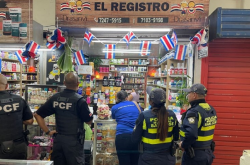
Global illicit medicines targeted by INTERPOL operation
31 October 2023




